Cover image: © UNICEF/UNI191941/Asselin
This High Quality Measles and Rubella SIAs elearning program teaches how to plan and implement high-quality supplementary immunization activities for injectable vaccines (using an example of measles and rubella vaccines). This learning reinforces the need for SIAs to be conducted as a part of the overall immunization programme and provides suggestions for strengthening routine immunization.
Learning objectives
At the end of this course you will be able to:
-
Learn to use the SIA Field guide and SIA Readiness Assessment tool to ensure successful SIA through adequate and timely planning and preparation, implementation, monitoring and evaluation of the effectiveness of SIA preparation and implementation.
-
Understand comprehensive macro- and micro- planning and budgeting, to ensure that all critical activities are considered, including rapid convenience monitoring (RCM), mop-up activities and post-SIA independent monitoring.
-
Know the importance of identification of hard-to-reach and high-risk groups, and of tailoring vaccination strategies to the community needs, ensuring equity.
Audience
The field guide and elearning are intended to provide a methodology and tools to immunization programme managers.
It is recommended that immunization staff include the Immunization eLearning Initiative courses as part of their professional development plan. Discuss with your supervisor to include this training curriculum as part of your 2017 goals.
Length
It should take 3.5-4 hours to complete this course. Each module should take 25-35 minutes to complete and must be completed in the order presented.
Methodology
Learning materials, including a field guide and eight elearning modules, are organized in chronological order, using a concept of project management to support the process of planning, implementation and monitoring of an SIA. Modules contain interactive quizzes, short videos with WHO staff and consultants messages, opportunities for reflections and recording ideas, and some test questions at the end of the modules.
Structure
This elearning program consist of an introduction and eight modules with integrated assessment questions. The modules focus on the following:
Module 1: Introduction [10 min]
Introduction to the importance of measles and rubella SIAs in relation to the objectives of the Global Vaccine Action Plan (GVAP) and WHO targets for measles and rubella elimination.
Module 2: National-level macroplanning [35 min]
National level macroplanning, focusing on planning organizational structure for coordination of the SIA, developing strategies to reach underserved and hard-to-reach populations, and developing a macroplan and budget estimate.
Module 3: Operational structure and preparation for microplanning [26 min]
Operational structure and preparation for microplanning, focusing on establishing SIA subcommittees and consolidation of information needed for microplanning, operational management structure, and how to plan for routine immunization strengthening activities.
Module 4: Microplanning [35 min]
Microplanning, focusing on finalizing plans for programme components, including estimations of vaccine and related equipment needs, personnel requirements and cold chain and logistics.
Module 5: Planning for training and communication [38 min]
Planning for training and communication, focusing on final stages of training and communications and how microplanning in earlier timeframes contributes to it.
Module 6: Pre-implementation activities [35 min]
Pre-implementation activities, focusing on the use of SIA Readiness Assessment tool.
Module 7: Implementation of the SIA [36 min]
Implementation activities, focusing on organization of the vaccination post, daily review meetings, and rapid convenience monitoring.
Module 8: Post-SIA activities: monitoring and evaluation [26 min]
Post-implementation activities, focusing on post-SIA monitoring and technical report.
Certificate
A certificate is available following the successful completion of all eight modules.
Contact details
For questions or feedback on this course, please contact Jhilmil Bahl, Capacity building officer at WHO: bahlj@who.int
